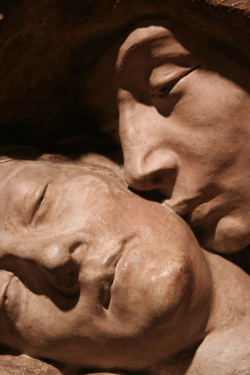 A detail image of a statue of a dead person (eyes closed, head oriented horizontally). A second figure in the statue has their face next to the dead person and lips and nose resting on their jawline. The figures are a pale grey-tan color.
A detail image of a statue of a dead person (eyes closed, head oriented horizontally). A second figure in the statue has their face next to the dead person and lips and nose resting on their jawline. The figures are a pale grey-tan color. - I was at a Veteran Affairs hospital, so one thing I thought of was how many of the patients had seen friends and leaders die in combat. I needed to be available for them as they experienced the same.
- If someone had called me and said, "Jesus has died and needs to be prepared for viewing. Their family will be here soon," I would have had no hesitations. Because that is someone I love and admire. This was an opportunity to offer that unconditional positive regard to each deceased patient, to express respect and support to each grieving family.
- In fact. before funeral science was professionalized this is what people did for each other, took care of bodies, prepared them, hosted mourners. It was an extension of being in community together.
I list these connections specifically for readers to help you all think about what would inspire and encourage you. Maybe it's something completely different.
Late in the summer, I got a call to prepare a body to be viewed and accompany the family. The veteran was an organ donor so there were bandages covering their eyes that had been applied as X's. It made me so sad. By this time in my experience, I had a pattern of greeting the body as I uncovered it.
"Hello, friend. I am really sorry that you died. I know dying is embarrassing, but I am here for you and I will be here for your family."
My best friend said, "How can it be embarrassing? They're dead."
I understood that as a scientific fact. But what I understood about the experience of being next to death or near it is that what we actually know about it is less than we think. Talking to the deceased patient also served to reduce my fear and helped me act in the ways that felt respectful. At my hospital, chaplain interns warmed the hands and face of the deceased person with blankets that had been in a warmer. (Those are the parts that family members were likely to want to touch. Warming them made the experience less uncomfortable.)
The hardest part for me was actually after the family had left. I had to cover the face.
"All right, friend. We are done here. I'm sorry, but I have to cover your face now. You are going to go get some more good care. Thank you again for your service."
The core of this learning was that I could become increasingly skilled as someone who could offer spiritual care and support from an authentic, tender place, even as I carried my own reactions and feelings, including sadness. Something, someone, that cannot die is not alive. The place of peace at which I arrived was simply that death is an inextricable part of life. Or to put it a different way, only 4% of the universe is visible. We people are a unique, artful moment in the universe, and, at some point, we expire. This is a small piece of holy knowing.
(Two) Resources On Death I Recommend:
- The Civilization of Maxwell Bright, movie. It looks like the whole thing is on YouTube.
- "The Emperor of Ice Cream" by Wallace Stevens
All the thanks in the world to Chaplain Thom Phillips, Thomas Olson, Rabbi Ballaban, and Mary Haley.
 RSS Feed
RSS Feed